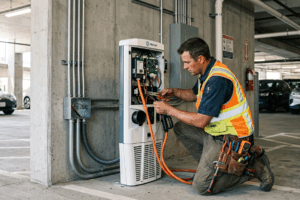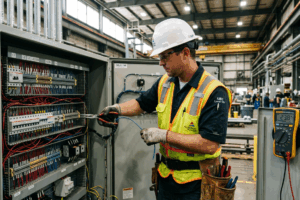
Utah Electrician Salary and Job Outlook for 2024
The state’s construction industry is a major economic driver, contributing $24.1 billion to Utah’s GDP as of January 2024 and employing over 143,000 people. From August 2023 to August 2024, the construction sector added 8,900 jobs. This intense activity creates a significant need for qualified electricians, leading to strong job security and an attractive Utah electrician salary that reflects the high demand.
What is the Average Utah Electrician Salary in 2024?
According to the U.S. Bureau of Labor Statistics (BLS) data from May 2023, the average annual pay for an electrician in Utah is approximately $61,460, which works out to an hourly wage of around $29.55. However, this figure is just a baseline. Salaries can range from around $45,150 for entry-level positions to over $79,930 for experienced professionals. Several factors, including license level, location, specialization, and union membership, significantly impact earning potential.
Utah Electrician Salary by Experience Level
The electrician career path in Utah offers clear stages for advancement, with each step bringing a significant increase in earning potential. Pay scales are directly tied to experience and licensure, as shown in estimates derived from BLS data.
- Utah Electrical Apprentice Wages: An apprentice is just starting their career, learning the trade through on-the-job training and classroom instruction. In Utah, an apprentice can expect to earn a wage in the lower percentile of electricians, around $45,150 per year (the 10th percentile) or about $21.71 an hour. This “earn while you learn” model is a major benefit of entering the trade.
- Journeyman Electrician Salary Utah: After completing an apprenticeship and meeting the Utah electrician license requirements, an individual becomes a journeyman electrician. At this level, they are fully qualified to work independently. The salary for a journeyman in Utah is near the state median of $60,180 annually, or about $28.93 per hour, according to May 2023 BLS data. In Salt Lake City, this can be slightly higher, with an average of $63,300 per year.
- Master Electrician Pay Scale & Contractor Income: With additional experience and testing, a journeyman can become a master electrician. This is the highest level of licensure and opens doors to owning a business. The master electrician pay scale for top earners in Utah is estimated to be between $72,210 (75th percentile) and $79,930 (90th percentile) annually. Those who become an electrical contractor in Utah can see their income potential grow even further, depending on the success of their business.
Key Factors Influencing Electrician Pay in Utah
While license level is a primary driver of income, other factors can significantly affect a Utah electrician hourly wage and overall earnings.
- Location: As with many professions, location matters. The Salt Lake City electrician salary is often higher than in more rural parts of the state due to a higher cost of living and greater concentration of large-scale construction projects. For instance, the cost of living in Salt Lake City is about 7-8% higher than the national average.
- Specialization: The debate of residential vs commercial electrician pay is ongoing, with commercial and industrial projects typically offering higher wages due to their complexity. Furthermore, electricians with specialized skills are in high demand. Expertise in areas like renewable energy, industrial automation, or data centers can lead to higher pay. Staying current with code changes is critical; for example, understanding how 2023 NEC rules are changing EV charger installation requirements can open up new job opportunities.
- Union Membership: Joining the International Brotherhood of Electrical Workers (IBEW) can also impact wages. IBEW Utah wage rates are determined by collective bargaining agreements and often include comprehensive benefits packages, including health insurance, pension plans, and guaranteed raises.
Job Outlook and Demand for Utah Electricians
The Utah electrician job growth outlook is exceptionally strong. The Utah Department of Workforce Services projects that jobs for electricians will increase much faster than the national average. Between 2022 and 2032, occupations in construction and extraction are projected for faster-than-average growth. In April 2024, the construction sector added 7,100 jobs year-over-year, one of the largest gains of any private industry in the state. This immense electrical work demand in Utah is fueled by a variety of large-scale projects, including residential communities, commercial office buildings, and significant infrastructure upgrades. The strong construction jobs outlook in Utah ensures a steady stream of work for electricians for the foreseeable future, making it a secure and stable career choice.
Building Your Career: The Electrician Career Path in Utah
Becoming a successful electrician is a journey that requires dedication, training, and a commitment to continuous learning. The path typically involves several key stages.
Starting Your Journey
Most electricians begin their career either by attending an electrician school or entering an apprenticeship program. Apprenticeships are highly popular as they combine paid, on-the-job training under the supervision of experienced electricians with the necessary technical classroom instruction. This hands-on approach ensures that new electricians are well-prepared for the demands of the job.
Advancing Your License
After completing the required hours of training and experience, an apprentice can apply to become a licensed journeyman electrician. The specific hours vary by license type: a Residential Journeyman license requires approximately 4,000 hours of on-the-job training, while a standard Journeyman license requires around 8,000 hours. This license is a major career milestone. As you gain more experience, you may choose to specialize or pursue a master electrician license. It’s crucial to stay informed about the specific Utah electrician license requirements by checking with the Utah Division of Occupational and Professional Licensing.
Balancing Salary with Cost of Living and Benefits
While the Utah electrician salary is competitive, it’s important to consider it in the context of living expenses. The cost of living for Utah electricians can vary, with metropolitan areas like Salt Lake City being more expensive than rural regions. However, even with a higher cost of living, the strong wages often allow for a comfortable lifestyle. Additionally, many employers offer excellent benefits for electricians in Utah, which can include health insurance, dental coverage, and retirement plans like a 401(k), adding significant value to the overall compensation package.
Stay Ahead of the Curve with Continuing Education
The electrical industry is constantly evolving with new technologies and updated codes. To remain competitive and maximize earning potential, lifelong learning is essential. Engaging in online electrical courses is an excellent way to stay current with the National Electrical Code (NEC) and other industry advancements.
For example, understanding how the latest NEC updates impact specialized fields can set you apart. Technicians who know how the 2023 NEC simplifies motor conductor sizing will be more efficient on industrial jobs. Likewise, with the growth of data infrastructure, being familiar with how 2023 NEC updates have changed modular data center egress requirements is a valuable skill.
Whether you’re just starting or are a seasoned professional, investing in your education is an investment in your career. Ready to enhance your skills and stay compliant? Browse our courses today to find state-approved continuing education tailored for Utah electricians.
Utah Continuing Education Courses
Explore our board-approved continuing education courses for Utah professionals:
View CE RequirementsUtah 2024 NFPA 70E Electrical Safety
Utah 2023 NEC Code Changes 16 Hours with 4 Hours NFPA 70E
Frequently Asked Questions
Is becoming an electrician a good career in Utah?
Absolutely. With a booming construction sector, a high demand for skilled labor, and strong projected job growth, Utah offers a stable and lucrative career path for electricians.
How long does it take to become a licensed electrician in Utah?
It typically takes about two to four years to complete an apprenticeship program. To be eligible for the license exam, you must complete the required on-the-job training and classroom instruction. This is approximately 4,000 hours for a residential journeyman license and 8,000 hours for a general journeyman license.
Disclaimer: The information provided in this educational content has been prepared with care to reflect current regulatory requirements for continuing education. However, licensing rules and regulations can vary by state and are subject to change. While we strive for accuracy, ExpertCE cannot guarantee that all details are complete or up to date at the time of reading. For the most current and authoritative information, always refer directly to your state’s official licensing board or regulatory agency.
NEC®, NFPA 70E®, NFPA 70®, and National Electrical Code® are registered trademarks of the National Fire Protection Association® (NFPA®)






